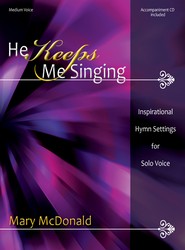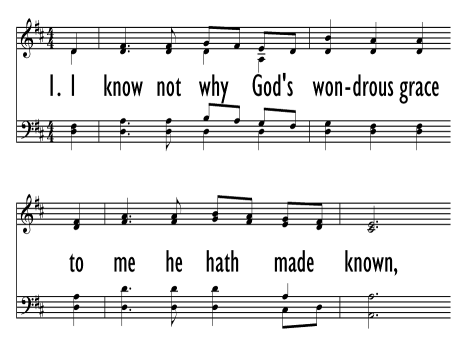- |
User Links
I Know Not Why God's Wondrous Grace

I know not why God's wondrous grace To me He hath made known
Author: D. W. Whittle (1883)Tune: EL NATHAN (McGranahan)
Published in 288 hymnals
Printable scores: PDF, MusicXMLPlayable presentation: Lyrics only, lyrics + musicAudio files: MIDI, Recording
Representative Text
1 I know not why God’s wondrous grace
to me is daily shown,
nor why, with mercy, Christ in love
redeemed me for his own.
Refrain:
But “I know whom I have believed,
and am persuaded that he is able
to keep that which I’ve committed
unto him against that day.”
2 I know not how this saving faith
to me he did impart,
nor how believing in his word
wrought peace within my heart. [Refrain]
3 I know not how the Spirit moves,
convincing us of sin,
revealing Jesus through the Word,
creating faith in him. [Refrain]
4 I know not when my Lord may come,
at night or noon-day fair,
nor if I’ll walk the vale with him,
or meet him in the air. [Refrain]
Source: Voices Together #590
Text Information
Related Texts
| First Line: | I know not why God's wondrous grace To me He hath made known |
| Title: | I Know Not Why God's Wondrous Grace |
| Author: | D. W. Whittle (1883) |
| Meter: | C. M. with refrain |
| Language: | English |
| Refrain First Line: | But "I know whom I have believed" |
| Notes: | Spanish translation: See "No sé por qué la gracia del Señor" by Salomón R. Mussiett; Swahili translation: See "Sijui sababu ya neema" |
| Copyright: | Public Domain |
English
- 112 Familiar Hymns and Gospel Songs #36
- 20th Century Gospel Songs #4
- 20th Century Gospel Songs: Youthspiration Packet Hymnal #8
- 50 Uncommon Songs: for partakers of the common salvation #16
- Alexander's Conference Hymnal #12
- Alexander's Gospel Songs #120
- Alexander's Gospel Songs No. 2 #61
- Alexander's Hymns No. 3 #12
- Alexander's Hymns No. 4 #83
- All-American Church Hymnal #51 10 shown out of 215
Korean
Spanish
Notes
Scripture References:
ref. = 2 Tim. 1:12
American evangelist Daniel Webster Whittle (b. Chicopee Falls, MA, 1840; d. Northfield, MA, 1901) wrote this text based on 2 Timothy 1:12, which is quoted in the refrain (King James Version). It was published with EL NATHAN in Gospel Hymns No.4 (1883).
The text contrasts the "I know not" stanzas with the certainty of the "I know" refrain We cannot understand God's saving grace to us (st. 1); we cannot explain our spiritual birth (st. 2); we are unable to comprehend the work of God's Spirit (st. 3); and we do not perceive clearly the future of our earthly lives (st. 4). But we do know by faith that God is true to his word!
Whittle was a bank cashier, Civil War soldier, and company treasurer before he became an evangelist. Earning the title of major during his military career, he was called Major Whittle throughout his life. Because of the influence of Dwight L. Moody whom he met during the war, Whittle became an itinerant evangelist in 1873. He conducted evangelistic campaigns in North America and Great Britain, often accompanied by popular gospel singers such as Philip P. Bliss (PHH 482), James McGranab and George Stebbins (PHH 63). These men not only sang at Whittle’s evangelistic meetings but also set to music many of his two hundred hymn texts (which he usually wrote under the pseudonym "El Nathan").
Liturgical Use:
As a hymn of response to preaching; for times of renewal; profession of faith; other testimonial services.
--Psalter Hymnal Handbook
Tune
EL NATHAN (McGranahan)James McGranahan (PHH 99), Whittle's song leader, composed EL NATHAN. The tunes title is a pseudonym used by Whittle. A typical gospel hymn tune, EL NATHAN is constructed with a few melodic lines and a very simple harmony, but it is marked by some rhythmic interest. The tune is easily sung in parts.…
Timeline
Arrangements
Media
Psalter Hymnal (Gray) #495
The United Methodist Hymnal #714
- MIDI file from Baptist Hymnal 1991 #337
- MIDI file from Baptist Hymnal 1991 #337
- Audio recording from Baptist Hymnal 2008 #353
- Audio recording from The Celebration Hymnal: songs and hymns for worship #527
- Audio recording from Celebrating Grace Hymnal #588
- MIDI file from The Cyber Hymnal #2865
- Audio recording from Lift Up Your Hearts: psalms, hymns, and spiritual songs #690
- MIDI file from Psalter Hymnal (Gray) #495
- MIDI file from Psalter Hymnal (Gray) #495
- Audio recording from Revival Hymns and Choruses #87
- Audio recording from Small Church Music #481
- Audio recording from Small Church Music #481
- Audio recording from Trinity Hymnal (Rev. ed.) #705
- MIDI file from Timeless Truths #578
- MIDI file from The United Methodist Hymnal #714
- Audio recording from The United Methodist Hymnal #714
- Audio recording from Worship and Rejoice #407
- MIDI file from Worship and Rejoice #407


 My Starred Hymns
My Starred Hymns






